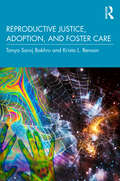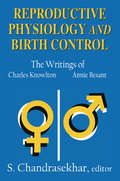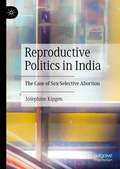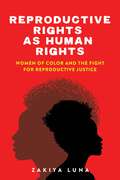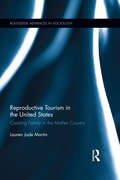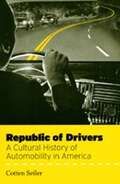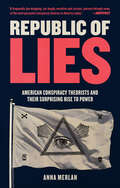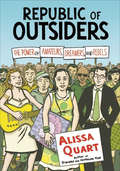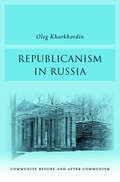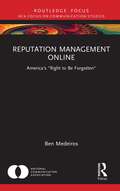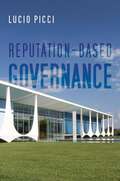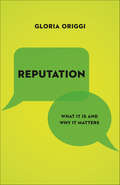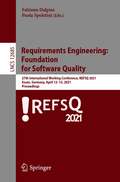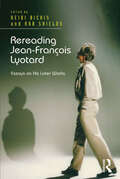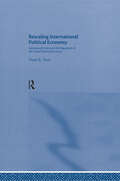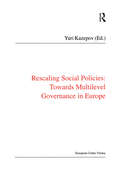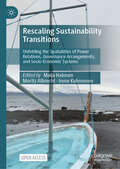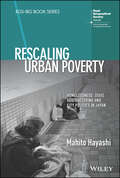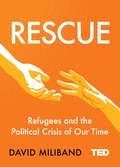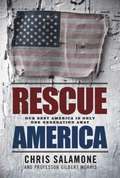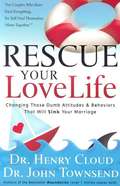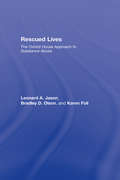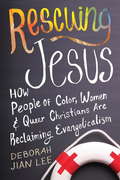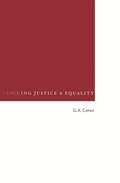- Table View
- List View
Reproductive Justice, Adoption, and Foster Care
by Tanya Saroj Bakhru Krista L. BensonUnderstanding practices of family separation and child removal necessitates considering the impacts of globalizing capitalism, colonialism, empire building and the establishment and normalization of systemic racism. In Reproductive Justice, Adoption, and Foster Care, the authors situate the colonial legacies of family separation, what it means to center the right parent, and Reproductive Justice and transnational feminist frameworks in conversation with one another in order to elucidate a more nuanced and comprehensive approach to recognizing the significance of contemporary examples of family separation. In doing so, the book showcases the connections between adoption and foster care within the intellectual and activist frameworks of human rights, Critical Adoption Studies, Reproductive Justice, and transnational feminisms. Epistemologically, Reproductive Justice and transnational feminisms meet at the point where both consider and interrogate globalizing capitalism, neoliberal economic and political ideologies, and the ways that various people—mostly people of color, poor people, women, children, and Indigenous people—are considered disposable. Critical Adoption Studies also importantly highlights the ways that adoption and foster care function as forms of family formation and as mechanisms of globalizing capitalism and state formation. Thus, it is critical that any exploration of the reproductive experiences of marginalized individuals interrogate and complicate notions of “choice” to advocate for justice. Reproductive Justice, Adoption, and Foster Care will be of interest to students of sociology, psychology, and social work, as well as scholars, activists, policymakers, and adoption and foster care practitioners.
Reproductive Physiology and Birth Control: The Writings of Charles Knowlton and Annie Besant
by S. Chandrasekhar"I say that this is a dirty, filthy book, and the test of it is that no human being would allow that book on his table, no decently educated English husband would allow even his wife to have ità." Such was the uncompromising pronouncement of Sir Hardinge Gifford, Her Majesty's Solicitor General, who in 1877 prosecuted Charles Bradlaugh and Annie Besant for publishing Dr. Charles Knowlton's Fruits of Philosophy.Knowlton's work was the first American medical handbook on contraception. It had become an incredibly popular book among Britons who believed the neo-Malthusian dictum that the only solution to poverty in Britain was a limit on the growth of its population. They saw effective birth control measures as a way to make such a limit practicable. In 1877, its publisher was hauled into court and pleaded guilty to printing obscene material. Bradlaugh and Besant tested the right of official harassment by bringing out an edition of the Fruits of Philosophy that bore an introduction explaining their motives. The pair was arrested and charged with violating the Obscene Publications Act of 1857.Their arrest, trial, conviction, and eventual acquittal constitute a landmark in the history of the world birth control movement. The enormous publicity accorded the principals and their cause brought the subject of family planning into the homes of nearly every Briton who read the newspapers' sensational coverage. What followed thereafter is telling: a dramatic, steady decline in the English birthrate. By their simple act of publishing Knowlton's short book, Bradlaugh and Besant helped establish England's pioneering role in the dissemination, democratization, and implementation of birth control information.Sripati Chandrasekhar is an internationally respected demographer and social scientist. He is a former minister of health and family planning in India and was vice-chancellor of Annamalai University in South India. He is the author of numerous books and articles on population and family planning.
Reproductive Politics in India: The Case of Sex-Selective Abortion
by Josephine KipgenThis monograph explores the full context of sex-selective abortion (SSA) in India by examining the historical forces, political movements, government policies, and gender regimes that shape this reproductive practice. Using qualitative research methods within a feminist methodology, including in-depth interviews with service providers and professionals in New Delhi and a content analysis of Indian newspapers, the study engages the following areas of analysis: the social structures and determinants of SSA in India, the potential for women’s agency in SSA, and the representations of SSA and SSA-seeking women in the Indian media. This research expands the discourse and analysis of SSA by facilitating a nuanced and multilayered exploration of a profoundly contextual, personal, and gendered reproductive issue by grounding data and interpretation in the lived experiences of research participants with systems-wide knowledge of SSA. Further, the feminist theory-informed analysis moves away from normative victimhood frameworks. Lastly, the book contributes to the understudied area of media discourse analysis on the intersections of gender and SSA in national news coverage. This book will be relevant for students, scholars, and teachers across the humanities and social sciences interested in reproductive rights, justice, and feminist research methods. It will also be a critical resource for sexual and reproductive health and rights (SRHR) advocates.
Reproductive Rights as Human Rights: Women of Color and the Fight for Reproductive Justice
by Zakiya LunaReveals both the promise and the pitfalls associated with a human rights approach to the women of color-focused reproductive rights activism of SisterSongHow did reproductive justice—defined as the right to have children, to not have children, and to parent—become recognized as a human rights issue? In Reproductive Rights as Human Rights, Zakiya Luna highlights the often-forgotten activism of women of color who are largely responsible for creating what we now know as the modern-day reproductive justice movement.Focusing on SisterSong, an intersectional reproductive justice organization, Luna shows how, and why, women of color mobilized around reproductive rights in the domestic arena. She examines their key role in re-framing reproductive rights as human rights, raising this set of issues as a priority in the United States, a country hostile to the concept of human rights at home.An indispensable read, Reproductive Rights as Human Rights provides a much-needed intersectional perspective on the modern-day reproductive justice movement.
Reproductive Tourism in the United States: Creating Family in the Mother Country (Routledge Advances in Sociology #142)
by Lauren Jade MartinThis book examines the United States as a destination for international consumers of assisted fertility services, including egg donation, surrogacy, and sex selection. Based on interviews conducted with fertility industry insiders who market their services to an international clientele in three of the largest American hubs of the global fertility marketplace - New York City, Los Angeles, and San Francisco - and focusing on the providers rather than the consumers of assisted fertility services, the book shines a light on how professional ethics and norms, in addition to personal moralities, shape the practice of reproductive tourism.
Republic Of Drivers: A Cultural History Of Automobility In America (Afterlives Of The Bible Ser.)
by Cotten SeilerRising gas prices, sprawl and congestion, global warming, even obesity—driving is a factor in many of the most contentious issues of our time. So how did we get here? How did automobile use become so vital to the identity of Americans? Republic of Drivers looks back at the period between 1895 and 1961—from the founding of the first automobile factory in America to the creation of the Interstate Highway System—to find out how driving evolved into a crucial symbol of freedom and agency. Cotten Seiler combs through a vast number of historical, social scientific, philosophical, and literary sources to illustrate the importance of driving to modern American conceptions of the self and the social and political order. He finds that as the figure of the driver blurred into the figure of the citizen, automobility became a powerful resource for women, African Americans, and others seeking entry into the public sphere. And yet, he argues, the individualistic but anonymous act of driving has also monopolized our thinking about freedom and democracy, discouraging the crafting of a more sustainable way of life. As our fantasies of the open road turn into fears of a looming energy crisis, Seiler shows us just how we ended up a republic of drivers—and where we might be headed.
Republic of Lies: American Conspiracy Theorists and Their Surprising Rise to Power
by Anna Merlan“[An] engrossing assessment of the profitable mainstreaming of conspiracy mongering in civic and political life . . . A lucid look at a slippery topic.” —Kirkus ReviewsAmerican society has always been fertile ground for conspiracy theories, but with the election of Donald Trump, previously outlandish ideas suddenly attained legitimacy. Trump himself is a conspiracy enthusiast: From his claim that global warming is a Chinese hoax to the accusations of “fake news,” he has fanned the flames of suspicion.But it was not one man alone who gave these ideas increased power. Republic of Lies looks beyond the caricatures of conspiracy theorists to explain their tenacity. Without lending the theories validity, Anna Merlan gives a nuanced, sympathetic account of the people behind them, across the political spectrum, and the circumstances that helped them take hold. The lack of a social safety net, inadequate education, bitter culture wars, and years of economic insecurity have created large groups of people who feel forgotten by their government and even besieged by it. Our contemporary conditions are a perfect petri dish for conspiracy movements: a durable, permanent, elastic climate of alienation and resentment. All the while, an army of politicians and media figures have peddled fear to serve their own ends.Bringing together penetrating historical analysis and gripping on-the-ground reporting, Republic of Lies transforms our understanding of American paranoia.“A captivating book that illuminates the landscape of conspiracy theories and what they might say about society as a whole.” —New York Magazine
Republic of Outsiders: The Power of Amateurs, Dreamers, and Rebels
by Alissa Quart&“Vivid portraits&” of individuals and subcultures by a writer who &“unmasks the assumptions we make about what counts as normal&” (The New York Times). They are outsiders who seek to redefine fields from mental health to diplomacy to music. They push boundaries and transform ideas. They include filmmakers crowdsourcing their work, transgender and autistic activists, and Occupy Wall Street&’s &“alternative bankers.&” These people create and package themselves in a practice cultural critic Alissa Quart dubs &“identity innovation.&” In this &“fascinating&” book, Quart introduces us to individuals who have created new structures to keep themselves sane, fulfilled, and, on occasion, paid. This deeply reported book shows how these groups now gather, organize, and create new communities and economies. Without a middleman, freed of established media, and highly mobile, unusual ideas and cultures are able to spread more quickly and find audiences and allies. Republic of Outsiders is a critical examination of those for whom being rebellious, marginal, or amateur is a source of strength (Barbara Ehrenreich). &“Even if you don&’t consider yourself an outsider or a rebel, Quart&’s book has several lessons for creative work, particularly when it comes to making art outside a heavily commercial system.&” —Fast Company &“One of the smartest cultural interpreters of her generation. In Republic of Outsiders, she mixes sharp-eyed analysis with an empathetic heart. The result is a great read, and a brand-new lens through which to view outsiders, insiders—and ourselves.&” —Susan Cain, author of Quiet: The Power of Introverts in a World That Can&’t Stop Talking
Republicanism in Russia: Community Before and After Communism
by Oleg KharkhordinMarxism was the loser in the Cold War, but Oleg Kharkhordin is not surprised that liberal democracy failed to take root after the Soviet Union’s dissolution. He suggests that Russians find a path to freedom by looking to the classical tradition of republican self-government and civic engagement already familiar from their history and literature.
Republics at War, 1776–1840
by Pierre Serna Antonino De Francesco Judith A. MillerThis collection probes the troubling connections between war and republic during Revolutionary era, 1776-1840. It presents the work of an international team of scholars, some of them in English for the first time.
Reputation Management Online: America's "Right to Be Forgotten" (NCA Focus on Communication Studies)
by Ben MedeirosThis book examines the work of the public relations, technology, and legal professionals who provide online "reputation management" services, situating their work within contemporary debates about regulating speech on the internet. The author argues that legal solutions like the European "Right to Be Forgotten" are not really possible in the U.S., but that the private solutions of reputation management help to ameliorate novel concerns about reputation. At the same time, he contends that these practices prompt different free speech and dignitary concerns unique to the digital environment. Drawing upon rhetorical and legal analysis of diverse texts, including reputation management promotional materials, interviews with practitioners, legal cases, and popular online commentary about reputational disputes themselves, the book intervenes in specific debates about the regulation of the internet, as well as broader socio-legal debates about the role of reputation-damaging speech in a democratic society. This timely and relevant study will have great relevance for all students and scholars of communication studies, public relations, rhetoric, new and digital media, internet law, technology and society, computer mediated communication, and sociology.
Reputation-Based Governance
by Lucio PicciIt would be easy to cheat someone on eBay. However, an essential characteristic of the site prevents this from happening: buyer and seller reviews form what amounts to an "index of reputation. " The availability of such an index provides a strong incentive to be an honest trader. Reputation-Based Governance melds concepts from businesses like eBay with politics. Author Lucio Picci uses interdisciplinary tools to argue that the intelligent use of widely available Internet technologies can strengthen reputational mechanisms and significantly improve public governance. Based on this notion, the book proposes a governance model that leans on the concept of reputational incentives while discussing the pivotal role of reputation in politics today. Picci argues that a continuous, distributed process of assessing policy outcomes, enabled by an appropriate information system, would contribute to a governance model characterized by effectiveness, efficiency, and a minimum amount of rent-seeking activity. Moreover, if citizens were also allowed to express their views on prospective policies, then reputation-based governance would provide a platform on which to develop advanced forms of participative democracy.
Reputation: What It Is and Why It Matters
by Gloria OriggiA compelling exploration of how reputation affects every aspect of contemporary lifeReputation touches almost everything, guiding our behavior and choices in countless ways. But it is also shrouded in mystery. Why is it so powerful when the criteria by which people and things are defined as good or bad often appear to be arbitrary? Why do we care so much about how others see us that we may even do irrational and harmful things to try to influence their opinion? In this engaging book, Gloria Origgi draws on philosophy, social psychology, sociology, economics, literature, and history to offer an illuminating account of an important yet oddly neglected subject.Origgi examines the influence of the Internet and social media, as well as the countless ranking systems that characterize modern society and contribute to the creation of formal and informal reputations in our social relations, in business, in politics, in academia, and even in wine. She highlights the importance of reputation to the effective functioning of the economy and e-commerce. Origgi also discusses the existential significance of our obsession with reputation, concluding that an awareness of the relationship between our reputation and our actions empowers us to better understand who we are and why we do what we do.Compellingly written and filled with surprising insights, Reputation pins down an elusive subject that affects everyone.
Requirements Engineering: 27th International Working Conference, REFSQ 2021, Essen, Germany, April 12–15, 2021, Proceedings (Lecture Notes in Computer Science #12685)
by Fabiano Dalpiaz Paola SpoletiniThis book constitutes the proceedings of the 27th International Working Conference on Requirements Engineering - Foundation for Software Quality, REFSQ 2021, which was due to be held in Essen, Germany, in April 2021. Due to the COVID-19 pandemic the conference was held virtually in April 2021. The special focus of this year`s REFSQ 2021 conference are contributions emphasizing the importance of human values, such as privacy and fairness, when designing software-intensive systems as well as the challenges that intelligent and autonomous systems pose due to the tight interplay with humans.
Rereading Jean-François Lyotard: Essays on His Later Works
by Heidi BickisWhat does Lyotard's thought offer contemporary theory? By focusing on key concepts and themes from his later texts, such as affect, aesthetics, Andre Malraux, St Paul, nihilism, infancy, space and writing, Rereading Jean-François Lyotard: Essays on His Later Works explores the impact and relevance of Lyotard's largely undiscussed late philosophical works for contemporary theoretical debates. In his works produced from 1990 until his death in 1998, Lyotard addresses a number of themes that both revisit and move beyond those from his earlier work. These include: art and aesthetics; affect; ethics and politics; modernity and the subject. Despite designating these texts as part of a 'late period', the chapters do not exclude a wider engagement with Lyotard's thought and often seek to engage in connections, resonances and developments across his many texts. Each chapter within this book places Lyotard as a figure with much to offer current theoretical debates, reasserts Lyotard as an important thinker for developments in social thought, and draws out the many links between his philosophical work and broader social questions. This is the first work in English to focus on Lyotard's later writings and will therefore be a key text to all scholars of his ideas.
Rescaling International Political Economy: Subnational States and the Regulation of the Global Political Economy
by Darel E. PaulA major trend in recent years in political and economic geography has been the increasingly sophisticated use of the concept of scale. Rescaling International Political Economy sits squarely in geographical debates regarding scale and globalization, but Darel Paul does it within the framework if international political economy. In particular, he argues for the importance of subnational states and localities in creating globalization, and focuses on regions in North America. Alongside his arguments about scalar transformations, Paul looks at how the processes serve transnational capital and how they work to construct the transnational capitalist class which currently rules the globe. His regulationist approach, which stresses how the centrality of state institutions in managing the global economy, will revolutionize how we think about globalization.
Rescaling Social Policies towards Multilevel Governance in Europe: Social Assistance, Activation and Care for Older People (Public Policy and Social Welfare)
by Yuri KazepovThe workings of multi-level governance -- institutional choices concerning centralisation, decentralisation and subsidiarity -- are widely debated within European public policy, but few systematic studies assessing the effects of changing divisions of power for policy-making have been carried out. This volume offers an assessment of the workings of multi-level governance in terms of social welfare policy across different clusters of European states -- Nordic, Southern European, Central and East European. This book reports on a major comparative study at the European Centre for Social Welfare policy and Research, which included partners from univerisities in Finland, France, Italy, Norway, Sweden, Poland, Spain and Switzerland. It reports on three particular policy areas: social assistance and local policies against poverty; activation and labour market policies; and care for the elderly. The authors describe different starting points, strategies and solutions in European countries which are facing similar challenges and could thus learn from each other. They explore the differences between European welfare regimes in terms of territorial responsibilities, the changes that have taken place over the past few years and their effects. The book is distinctive in highlighting comparative transversal and transnational issues of multi-level governance in social welfare policies, rather than presenting country reports.
Rescaling Sustainability Transitions: Unfolding the Spatialities of Power Relations, Governance Arrangements, and Socio-Economic Systems
by Maija Halonen Moritz Albrecht Irene KuhmonenThis Open Access book explores sustainability transitions with a focus on their influence on the relationships between cores and peripheries, the rural and the urban, and the large and the small-scale. The societal changes induced by sustainability transitions are expected to assemble as a variegated and heterogeneous process reproduced by different spatial contexts and scales. Hence, the practical solutions and impacts of processes framed as sustainability transitions are expected to vary between different localities in terms of their natural, material, or human resources, the heritage of the development, their power and market relations, virtual and physical connections as well as shifting individual rationalities – within and across certain socio-economic spaces. To highlight these socio-spatial processes, their alignments, frictions and contradictions for sustainability transitions, this book and its contributions call for an increased engagement in the scalar aspects of sustainability transitions and their governance. The authors argue that rescaling follows from two observations on the extant literature concerning sustainability transitions. Firstly there is a call for a stronger engagement of sustainability transitions research with questions of place and relocalization practices, their embedded power relations, but also questions on small-scale trajectories for the territorial and economic materializations in terms of production and market reach as an alternative to the large-scale dominance of resource exploitation and use. Secondly there is a call for increased attention to the relational processes and ontological framing that reproduce mobilities and scalar shifts in governance arrangements.
Rescaling Urban Poverty: Homelessness, State Restructuring and City Politics in Japan (RGS-IBG Book Series)
by Mahito HayashiRESCALING URBAN POVERTY “In this path-breaking book, Mahito Hayashi explores the rescaled geographies of homelessness that have been produced in contemporary Japanese cities. Through an original synthesis of regulationist political economy and immersive place-based research, Hayashi situates urban homelessness in Japan in comparative-international contexts. The book offers new theoretical perspectives from which to decipher emergent forms of urban marginality and their contestation.” —Neil Brenner, Lucy Flower Professor of Urban Sociology, University of Chicago “Mahito Hayashi traces the shifting spatial strategies of unhoused people as they create spaces of emancipation within Japanese cities. Attending to the complexities of contentious class politics and livelihoods barely sustained by the survival economies, Rescaling Urban Poverty is a unique and valuable contribution to the study of the geographies of urban social movements.” —Nik Theodore, Head of the Department of Urban Planning and Policy, University of Illinois Chicago Rescaling Urban Poverty provides the essential understanding of how state rescaling ensnares homeless and impoverished people in the interplay of the state, domiciled society, public space, urban class relations, social movements, and capitalism. Its three angles—national states, public and private spaces, and urban social movements—uncover the hidden dynamics of rescaling that emerge, and are resisted, at the fringes of mainstream (domiciled) society and its housing regimes/classes. Evidence is drawn from Japanese cities where the author has conducted long-term fieldwork and develops robust urban narratives by mobilising spatial regulation theory, metabolism theory, state theory, and critical housing theory. Rescaling Urban Poverty cross-fertilises these strands through meticulous efforts to reinterpret both old and new texts. By building bridges between classical and contemporary interests, and between the theories and Japanese cities, this book attracts various audiences in geography, sociology, urban studies, and political economy.
Rescue
by David MilibandWe are in the midst of a global refugee crisis. Sixty five million people are fleeing for their lives. The choices are urgent, not just for them but for all of us. What can we possibly do to help? With compassion and clarity, David Miliband shows why we should care and how we can make a difference. He takes us from war zones in the Middle East to the heart of Europe to explain the crisis and show what can be done, not just by governments with the power to change policy but by citizens with the urge to change lives. His innovative and practical call to action shows that the crisis need not overwhelm us. Miliband says this is a fight to uphold the best of human nature in the face of rhetoric and policy that humour the worst. He defends the international order built by western leaders out of the ashes of the Second World War, but says now is the time for reform. Describing his family story as the son of refugees, and drawing revealing lessons from his life in politics, David Miliband shows that if we fail refugees then we betray our own history, values and interests. The message is simple: rescue refugees and we rescue ourselves.
Rescue America: Our Best America Is Only One Generation Away
by Chris SalamoneAuthor Chris Salamone offers inspiring action steps that every American can implement tomorrow and feel that they're making a difference. Exemplary citizenship requires learning the roots of our country's once-great promise and embodying the values of personal responsibility, gratitude, and sacrifice. Salamone presents revolutionary ideas for: revamping entitlement programs or eliminating them entirely; implementing a two-year mandatory national service, and investing in early childhood education -- in schools and in the home -- to create a greater sense of citizenship in future generations right from the start. While Salamone has strong conservative connections, this book attacks the weaknesses seen in both parties, and is intriguing regardless of one's political position. Working with Dr Gilbert Morris, the author analyses our founding documents and creates clear and specific connections between the loss of our founding values and the problems we face in our current political, economic, and cultural environment.
Rescue Your Love Life: Changing Those Dumb Attitudes and Behaviors That Will Sink Your Marriage
by John D. Townsend Henry CloudDrs. Cloud and Townsend employ their vast experience as marriage therapists and personal change coaches to aid couples who are drowning in a sea of good intentions-- undermined by their mindless, relationship-defeating comments and unkind behaviors. Their spiritual insights are eye-opening. And you'll find straight talk on romance, sex, communications, conflict resolution, etc. with Christian perspectives.
Rescued Lives: The Oxford House Approach to Substance Abuse
by Karen J. Foli Leonard A. Jason Bradley D. OlsonAn effective treatment to help those with addictions Victims of drug addiction, chronic illness, and mental illness all too often are overwhelmed with the affliction called hopelessness. Oxford Houses succeed because their substance abuse treatment approach instills the most powerful medicine—hope for recovery. Rescued Lives: The Oxford House Approach to Substance Abuse provides a comprehensive thought-provoking look at just how the innovative Oxford House model inspires positive action on one of our country’s most serious problems—substance abuse. This powerful book presents the success stories of the people living in these community homes and explains just how it has worked for them. Rescued Lives: The Oxford House Approach to Substance Abuse gives an insightful review of Oxford House’s history and the development of the approach. Residents’ stories reveal the treatment process on the road to recovery, allowing readers to glimpse the path each individual must travel to gain entrance and assimilate into the House community. As the residents gain more control over themselves living substance free, the reader discovers the importance of relationships and reframing of self in the recovery process. This powerful book can provide hope to those individuals who feel they have lost themselves in alcohol, drugs, and mental illness. Foreword by substance abuse scholar Bill White. Topics in Rescued Lives: The Oxford House Approach to Substance Abuse include: • an overview of substance abuse in today’s society • a history of Oxford House to the present • substance abuse treatment approaches • the process of a resident’s entrance and assimilation • providing hope and living substance free • the nationwide expansion of Oxford Houses • recovery, and what it means to women, children, and families • criminal offenders in Oxford House • how the Oxford House model is constructed in order to help disenfranchised individuals from society • the nine Oxford House Traditions • a review of the strong evidence that Oxford House works —and why • and more! Rescued Lives: The Oxford House Approach to Substance Abuse is enlightening reading for educators and students of psychology, sociology, urban studies, education, and other courses designed to prepare students for careers in the helping professions. This book is also essential for practicing clinicians, anyone concerned with society’s problems and those impacted by substance abuse and mental illness.
Rescuing Jesus
by Deborah Jian LeeAn inside look at the young, diverse, progressive Christians who are transforming the evangelical movementDeborah Jian Lee left the evangelical world because she was frustrated by its conservative politics. But over the years she stayed close to those in the movement, and she has come to realize that evangelical culture and politics are changing, and changing fast. Friends had stopped voting based on wedge issues. Believers of color were changing church demographics and political interests. Women were rising in the ranks despite familiar sermons about female submission. LGBTQ Christians were coming out, staying in the church, and leading ministries.What Lee came to find is that most of what we think we know about evangelicals is wrong, or is well on its way to becoming dated. In Rescuing Jesus, she ventures into the world of progressive evangelicalism and tells the stories of the young women and men at the forefront of a movement that could change both the face and the substance of religion in the United States.Generational changes and the shifting racial make-up of evangelicals are transforming the movement and pushing it in a more progressive direction. A young and diverse array of people on this leading edge of progressive evangelicalism--LGBTQ and straight; white, black, Asian, Hispanic, and indigenous--are working to wrest political power away from conservatives. Today's young evangelicals are more likely than their elders to accept same-sex marriage, more inclined to think of "pro-life" issues as being about supporting society's disenfranchised, and more accepting of equality between men and women.With empathy, journalistic rigor, and powerful storytelling, Lee unpacks the diverse and complex strands of this movement--and what it means for the rest of us. Given the clout that evangelicals still hold in national politics, Lee argues, this movement is important not only for the future of evangelicalism but also for the future of our country.From the Hardcover edition.
Rescuing Justice and Equality
by G. A. CohenArguing against the Rawlsian version of a just society, Cohen demonstrates that distributive justice does not tolerate deep inequality. In the course of providing a deep and sophisticated critique of Rawlsian's theory of justice, Cohen demonstrates that questions of distributive justice arise not only for the state but also for people in their daily lives. The right rules for the macro scale of public institutions and policies also apply, with suitable adjustments, to the micro level of individual decision-making.
